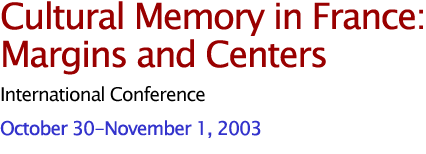 |
Keynote SPEAKERSAnnette Becker (Université de Paris X-Nanterre) Malcolm Bowie (Christ's College, Cambridge) Nelly Furman (Cornell University) Lawrence D Kritzman (Dartmouth College) Ann Rigney (Utrecht University) |
|||
|
The role of memory in the construction of collective identities has in recent years been the focus of growing scholarly interest. In France, a key collaborative work shaping the debate among historians has been Pierre Nora's Les Lieux de Mémoire. At the same time, scholars in the field of cultural studies in both the English- and French-speaking worlds have become increasingly alert to the dialogue between past and present inscribed in a wide variety of cultural practices. In each of these fields, the role of differential power structures has been recognized as a major factor structuring the relationship between memory and culture. The Winthrop-King Institute for Contemporary French and Francophone Studies now aims to advance and refocus these debates by sponsoring an international conference on the dynamic interplay between cultural memory and the evolution of hierarchically structured collective identities in France. How and why have previously marginalized memories entered into mainstream conceptions of the past at different moments in time? To what extent have they been modified by or assimilated into dominant collective memories? In what ways and in what circumstances have formerly occluded or clandestine memories become the sites of rival power centers, subverting or surmounting dominant notions of the past? These are among the issues explored in this interdisciplinary conference.
Conceptions of French nationhood occupy a major but not unchallenged position in these debates. Taking his inspiration from the classical and medieval notion of loci memoriae, or memory places, Nora applied the term lieux de mémoire (sites of memory) to explore the role played by memory in the construction of the French idea of the nation. Yet in the medieval period from which Nora borrowed this term, the dominant forms of collective identity were vastly different from the modern conception of the nation-state. Moreover, as the final volumes of Nora's edited study attest, in the contemporary period the idea of a shared national past as the central framing device for collective identities in France has been increasingly challenged by sub-, trans- and supra-national forces which are reconstructing the topography of 'centers' and 'margins' in the spaces of cultural memory. The idea of the nation as the 'naturally' dominant center of collective memories is thus in many ways under siege in the work of historians, contemporary cultural analysts and many other scholars in a wide range of disciplines including literary studies, social anthropology, media studies and social psychology. In exploring these issues, conference speakers will focus on the complex interplay between memory, culture and social hierarchy during different historical periods, in which the idea of French nationhood has been a major but by no means the only center of gravity.

